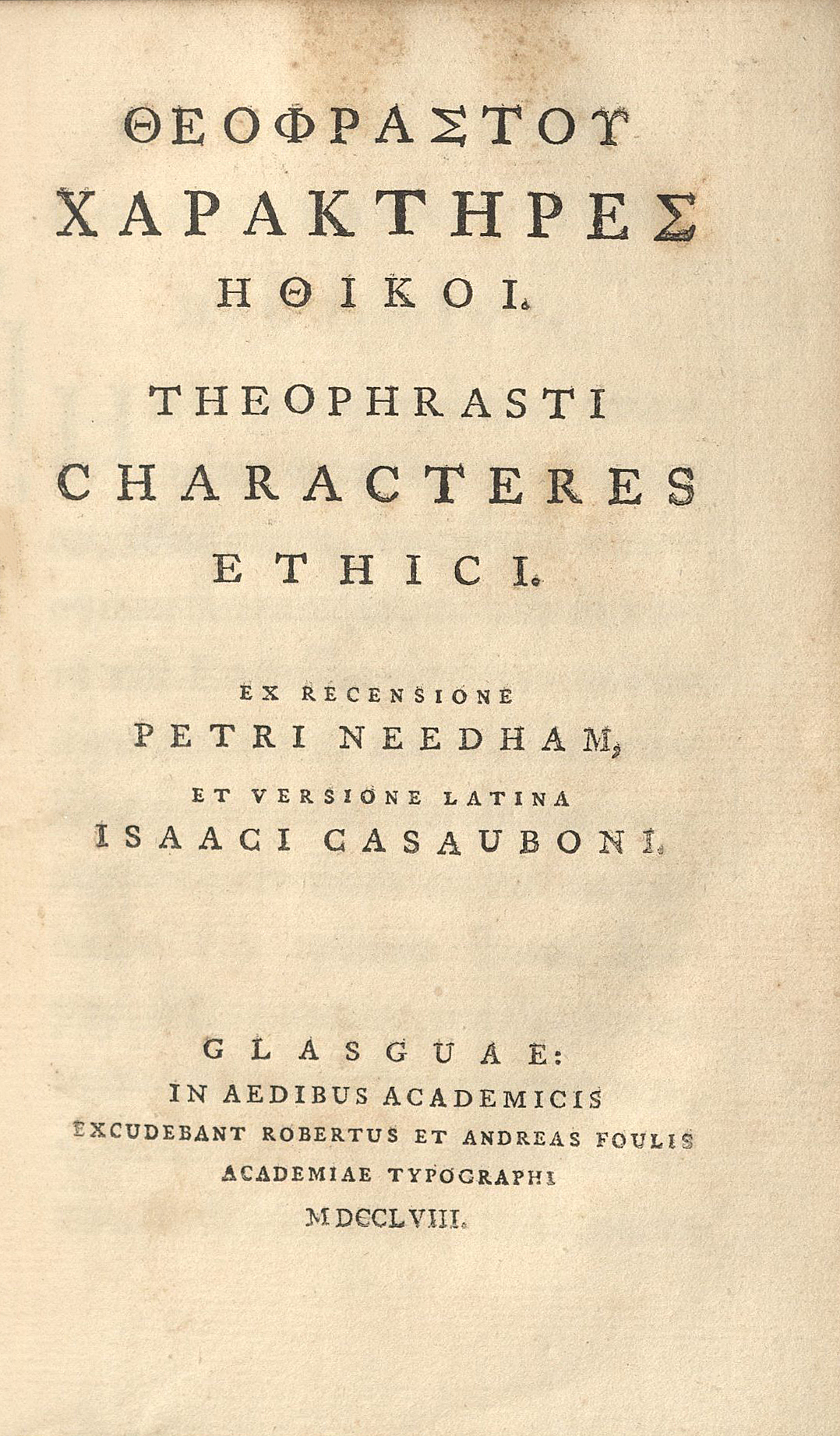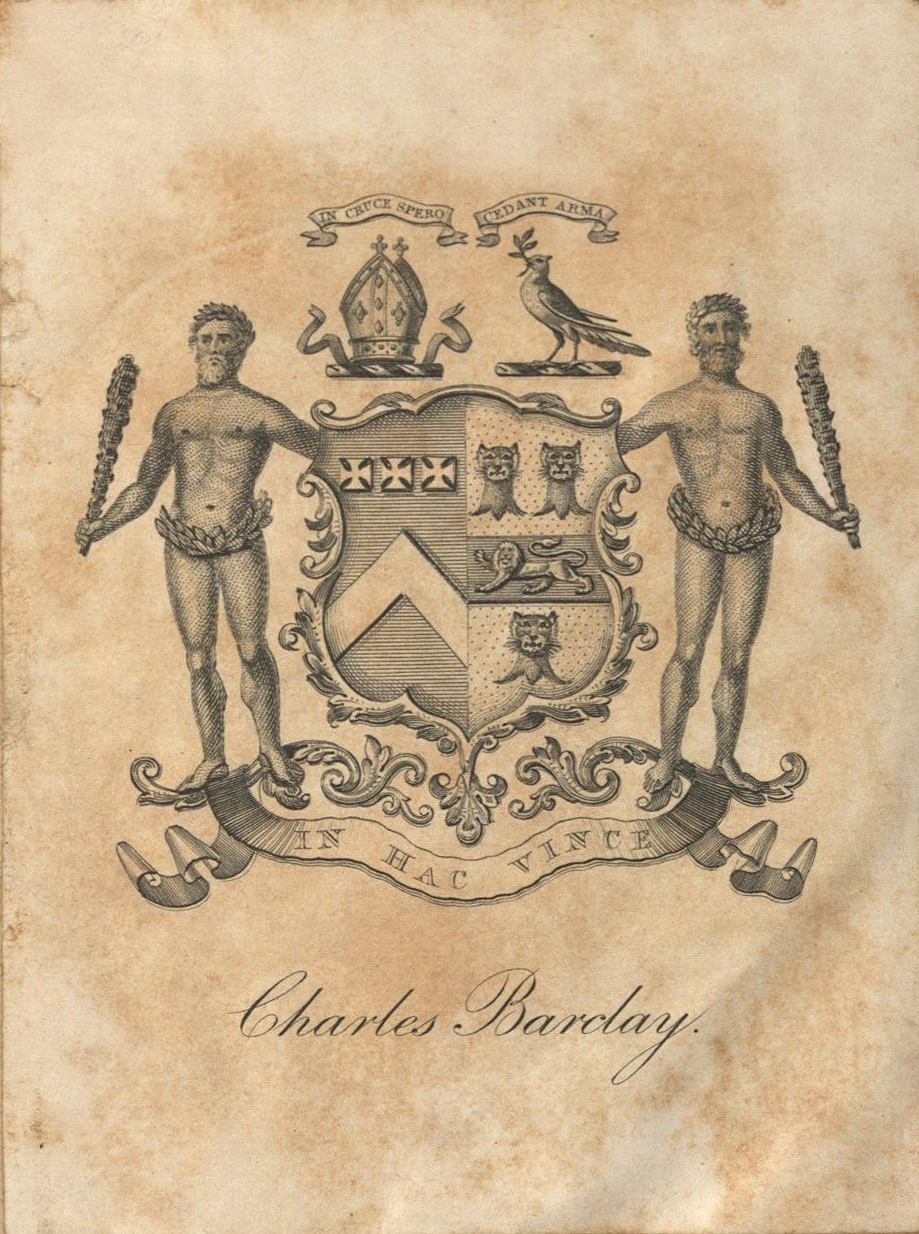Difference between revisions of "Theophrastou Charaktēres Εthikoi"
(Created page with "{{DISPLAYTITLE:'' Theophrastou Charaktēres Εthikoi''}} <big>''Theophrastou Charaktēres Εthikoi = Theophrasti Characteres Ethici''</big> ===by Theophrastus=== Glasguae: Ex...") |
m |
||
| (20 intermediate revisions by 9 users not shown) | |||
| Line 1: | Line 1: | ||
| − | {{DISPLAYTITLE: | + | {{DISPLAYTITLE:''Theophrastou Charaktēres Εthikoi = Theophrasti Characteres Ethici''}} |
| − | |||
===by Theophrastus=== | ===by Theophrastus=== | ||
| + | {{BookPageInfoBox | ||
| + | |imagename=Theophrastus CharakteresEthikoi1758 Title.jpg | ||
| + | |link=https://wm.primo.exlibrisgroup.com/permalink/01COWM_INST/g9pr7p/alma991034088652003196 | ||
| + | |shorttitle=Theophrastus's Moral Characters | ||
| + | |author=[[:Category:Theophrastus|Theophrastus]] | ||
| + | |lang=[[:Category:Greek|Greek]], [[:Category:Latin|Latin]] | ||
| + | |publoc=[[:Category:Glasgow|Glasguae]] | ||
| + | |publisher=Excudebant Robertus et Andreas Foulis | ||
| + | |year=1758 | ||
| + | |pages=132 | ||
| + | |desc=[[:Category:Octavos|8vo]] (16 cm.) | ||
| + | |shelf=I-4 | ||
| + | }}[[File:Theophrastus CharakteresEthikoi1758 Bookplate2.jpg|left|thumb|250px|Bookplate of Charles Barclay, front free endpaper.]][[wikipedia:Theophrastus|Theophrastus]] (c.371 – 287 BCE) was a Greek philosopher and zoologist, and successor of [[wikipedia:Aristotle|Aristotle]]. He was originally from Eresus, on Lesbos, and later moved to the Lyceum at Athens to study under Aristotle. Theophrastus developed upon Aristotle's ideas and arrived at independent conclusions. Unlike Aristotle, he retained a belief in the divinity of the heavens and the eternity of the universe.<ref>Robert William Sharples, [http://www.oxfordreference.com/view/10.1093/acref/9780192801074.001.0001/acref-9780192801074-e-521 "Theophrastus,"] in ''Who's Who in the Classical World'', ed. Simon Hornblower and Tony Spawforth (Oxford: Oxford University Press, 2003), accessed April 1, 2015.</ref> | ||
| − | + | Theophrastus's ''Moral Characters'' is his best-surviving work. It demonstrates Theophrastus's interest in human behavior and includes a series of sketches of 30 more or less undesirable types of personality. A unique feature of the ''Characters'' is its focus on superficial behavioral irregularities. Historians are not certain about ''Moral Characters's'' purpose but have suggested that it may have been used to teach ethics, rhetoric or poetics, or may have been used as entertainment.<ref>William W. Fortenbaugh, "Theophrastus, the ''Characters'' and Rhetoric," in ''Peripatetic Rhetoric After Aristotle'', ed. William W. Fortenbaugh et. al. (New Brunswick, NJ: Transaction Publishers, 1994), 16.</ref> Overall, Theophrastus is better known for his botanical and philosophical treatises. | |
| + | ==Evidence for Inclusion in Wythe's Library== | ||
| + | Listed in the [[Jefferson Inventory]] of [[Wythe's Library]] as "Theophrasti careteres. Gr. Lat. 12mo. Foulis" This was one of the titles kept by [[Thomas Jefferson]]. Jefferson may have sold it the Library of Congress in 1815. Both [http://www.librarything.com/profile/GeorgeWythe George Wythe's Library]<ref>''LibraryThing'', s. v. [http://www.librarything.com/profile/GeorgeWythe "Member: George Wythe"], accessed on February 2, 2015.</ref> on LibraryThing and the [https://digitalarchive.wm.edu/handle/10288/13433 Brown Bibliography]<ref> Bennie Brown, "The Library of George Wythe of Williamsburg and Richmond," (unpublished manuscript, May, 2012) Microsoft Word file. Earlier edition available at: https://digitalarchive.wm.edu/handle/10288/13433</ref> list the 1758 edition published in Glasgow based on the Jefferson copy at the Library of Congress.<ref>E. Millicent Sowerby, ''Catalogue of the Library of Thomas Jefferson'', (Washington, D.C.: The Library of Congress, 1952-1959), 2:382 [http://babel.hathitrust.org/cgi/pt?id=mdp.39015033648109;view=1up;seq=400 [no.2152]].</ref> While the copy still exists, it includes no definitive ties to Wythe. Despite this, the Wolf Law Library purchased a copy of the 1758 edition of ''Theophrastou Charaktēres Εthikoi''. | ||
| + | [[File:Theophrastus CharakteresEthikoi1758 Bookplate1.jpg|left|thumb|250px|Bookplate, front pastedown.]] | ||
| + | |||
| + | ==Description of the Wolf Law Library's copy== | ||
| + | Bound in contemporary red morocco, borders roll-tooled in gilt. Spine features gilt compartments with gilt green morocco label. Edges gilt. Includes an unidentified oval armorial bookplate of a European count on the front pastedown and the bookplate of [[wikipedia: Charles_Barclay (MP)|Charles Barclay]] (1780-1855) with his arms impaled with those of his wife, Anna Maria Kett, on the front free endpaper. Bound-with the 1771 publication of ''Tou Kebētos Pinax'' (''The Tablet of Cebes'') edited by [[wikipedia: Jakob Gronovius| Jakob Gronovius]]. Purchased with the [[:Category:George Wythe Boswell-Caracci Room Acquisition Fund|George Wythe Boswell-Caracci Room Acquisition Fund]]. | ||
| + | |||
| + | Images of the library's copy of this book are [https://www.flickr.com/photos/wolflawlibrary/albums/72177720312336180/with/53300566690 available on Flickr.] View the record for this book in [https://wm.primo.exlibrisgroup.com/permalink/01COWM_INST/g9pr7p/alma991034088652003196 William & Mary's online catalog.] | ||
| + | |||
| + | ==See also== | ||
| + | *[[Jefferson Inventory]] | ||
| + | *[[Wythe's Library]] | ||
| + | |||
| + | ==References== | ||
| + | <references/> | ||
| + | |||
| + | __NOTOC__ | ||
| + | |||
| + | [[Category:George Wythe Collection at William & Mary's Wolf Law Library]] | ||
| + | [[Category:Jefferson's Books]] | ||
[[Category:Philosophy]] | [[Category:Philosophy]] | ||
| + | [[Category:Theophrastus]] | ||
[[Category:Titles in Wythe's Library]] | [[Category:Titles in Wythe's Library]] | ||
| + | |||
| + | [[Category:George Wythe Boswell-Caracci Room Acquisition Fund]] | ||
| + | [[Category:Glasgow]] | ||
| + | [[Category:Greek]] | ||
| + | [[Category:Latin]] | ||
Latest revision as of 16:48, 15 November 2023
by Theophrastus
| Theophrastus's Moral Characters | |
|
Title page from Theophrastus's Moral Characters, George Wythe Collection, Wolf Law Library, College of William & Mary. | |
| Author | Theophrastus |
| Published | Glasguae: Excudebant Robertus et Andreas Foulis |
| Date | 1758 |
| Language | Greek, Latin |
| Pages | 132 |
| Desc. | 8vo (16 cm.) |
| Location | Shelf I-4 |
Theophrastus's Moral Characters is his best-surviving work. It demonstrates Theophrastus's interest in human behavior and includes a series of sketches of 30 more or less undesirable types of personality. A unique feature of the Characters is its focus on superficial behavioral irregularities. Historians are not certain about Moral Characters's purpose but have suggested that it may have been used to teach ethics, rhetoric or poetics, or may have been used as entertainment.[2] Overall, Theophrastus is better known for his botanical and philosophical treatises.
Evidence for Inclusion in Wythe's Library
Listed in the Jefferson Inventory of Wythe's Library as "Theophrasti careteres. Gr. Lat. 12mo. Foulis" This was one of the titles kept by Thomas Jefferson. Jefferson may have sold it the Library of Congress in 1815. Both George Wythe's Library[3] on LibraryThing and the Brown Bibliography[4] list the 1758 edition published in Glasgow based on the Jefferson copy at the Library of Congress.[5] While the copy still exists, it includes no definitive ties to Wythe. Despite this, the Wolf Law Library purchased a copy of the 1758 edition of Theophrastou Charaktēres Εthikoi.
Description of the Wolf Law Library's copy
Bound in contemporary red morocco, borders roll-tooled in gilt. Spine features gilt compartments with gilt green morocco label. Edges gilt. Includes an unidentified oval armorial bookplate of a European count on the front pastedown and the bookplate of Charles Barclay (1780-1855) with his arms impaled with those of his wife, Anna Maria Kett, on the front free endpaper. Bound-with the 1771 publication of Tou Kebētos Pinax (The Tablet of Cebes) edited by Jakob Gronovius. Purchased with the George Wythe Boswell-Caracci Room Acquisition Fund.
Images of the library's copy of this book are available on Flickr. View the record for this book in William & Mary's online catalog.
See also
References
- ↑ Robert William Sharples, "Theophrastus," in Who's Who in the Classical World, ed. Simon Hornblower and Tony Spawforth (Oxford: Oxford University Press, 2003), accessed April 1, 2015.
- ↑ William W. Fortenbaugh, "Theophrastus, the Characters and Rhetoric," in Peripatetic Rhetoric After Aristotle, ed. William W. Fortenbaugh et. al. (New Brunswick, NJ: Transaction Publishers, 1994), 16.
- ↑ LibraryThing, s. v. "Member: George Wythe", accessed on February 2, 2015.
- ↑ Bennie Brown, "The Library of George Wythe of Williamsburg and Richmond," (unpublished manuscript, May, 2012) Microsoft Word file. Earlier edition available at: https://digitalarchive.wm.edu/handle/10288/13433
- ↑ E. Millicent Sowerby, Catalogue of the Library of Thomas Jefferson, (Washington, D.C.: The Library of Congress, 1952-1959), 2:382 [no.2152].


